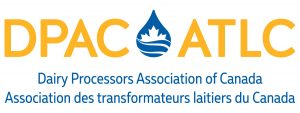May 27, 2020 –
STATEMENT BY THE FOUR DAIRY PROCESSORS ASSOCIATIONS




Canada’s dairy processors, already hurt by lost business due to recent international trade agreements and COVID-19, are warning the federal government that the continued viability of the dairy sector is at stake if CUSMA dairy import licences (known as tariff rate quotas, or ‘TRQs’) are allocated to non dairy stakeholders.
The federal government has promised to fully and fairly compensate dairy processors for their losses stemming from trade agreements, but so far no such compensation has been offered except for a relatively small program announced in 2016 in the context of the trade agreement with the Europe Union (EU). Dairy processors have been steadfast in advocating for a two-fold approach to mitigate these losses:
- Allocation of dairy TRQs to Canadian dairy processors, and
- Direct compensation to dairy processors.
Dairy processing is carried out in every province by small, medium and large enterprises that provide valuable employment and economic benefits in the largely rural communities they serve. More than 10,000 farms rely on Canada’s 417 dairy processing plants to take their milk and process it into hundreds of nutritious staples, from milk, yogurt and ice cream to butter and award-winning cheeses.
As the dairy sector is already reeling from the impact of COVID-19, allocating CUSMA’s TRQs to non-dairy stakeholders that have no vested interest in the dairy sector, as the federal government did in 2017 through the trade agreement with the EU, will only bring further disruptions to an already fragile domestic market.
Unlike non dairy stakeholders, dairy processors have invested billions in the Canadian dairy industry in the last 10 years through expansion, plant upgrades, and products innovation. If the vast majority of CUSMA’s TRQs is allocated to dairy processors, it will:
- Ensure stability in the Canadian dairy market,
- Introduce a variety of competitively priced imported products that complement, rather than compete with ‘Made with Canadian milk’ goods.
The unexpected early implementation of CUSMA on July 1st, meanwhile, will prove unnecessarily disruptive to the Canadian dairy sector. As the dairy processing industry cautiously looks forward to the country’s economic recovery from COVID-19, now is not the time to further disrupt Canada’s supply-managed dairy marketplace by giving a share of CUSMA-related TRQs to stakeholders that have no vested interest in value creation in the dairy sector.
The future of Canadian dairy farmers and processors is intricately tied to the success of the Canadian dairy sector as a whole — from farm to table. And, Canadian dairy processors need the vast majority of CUSMA’s dairy TRQs to help it remain viable and meet the enormous challenges that lie ahead.